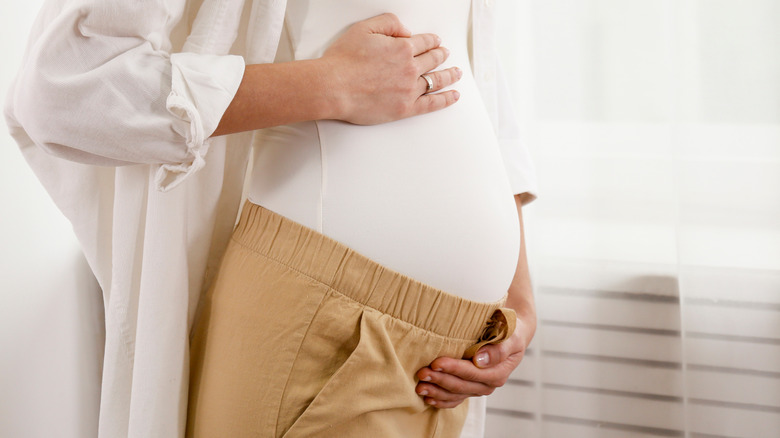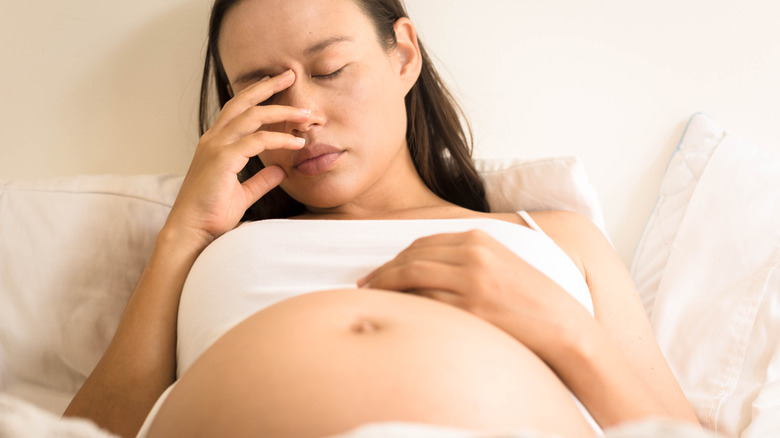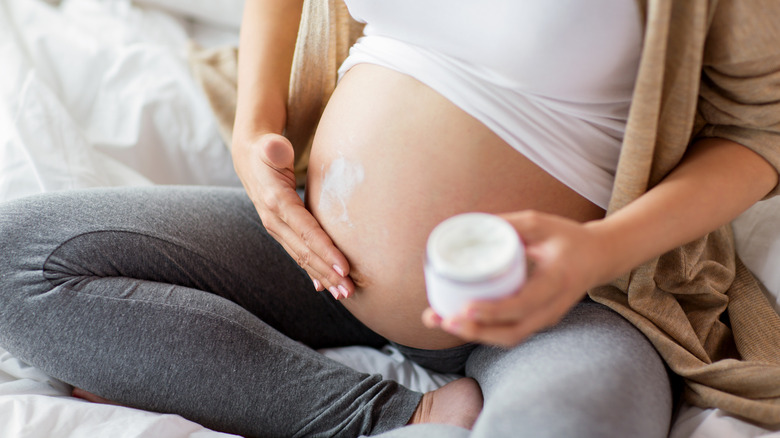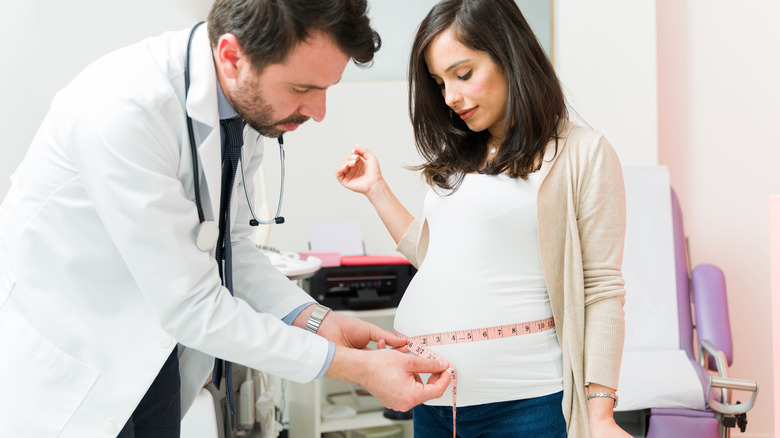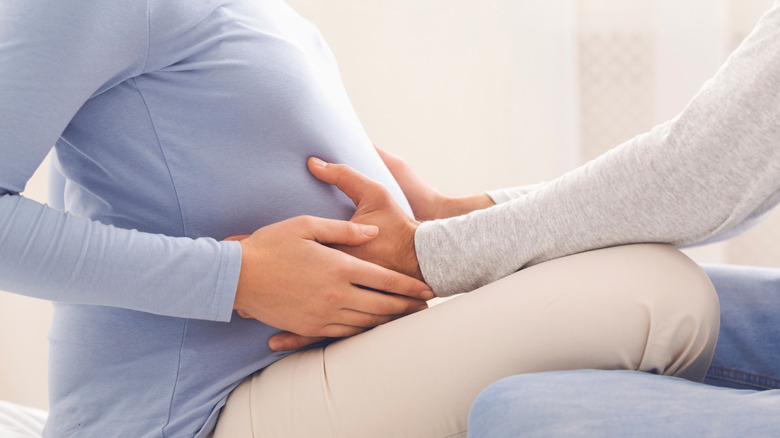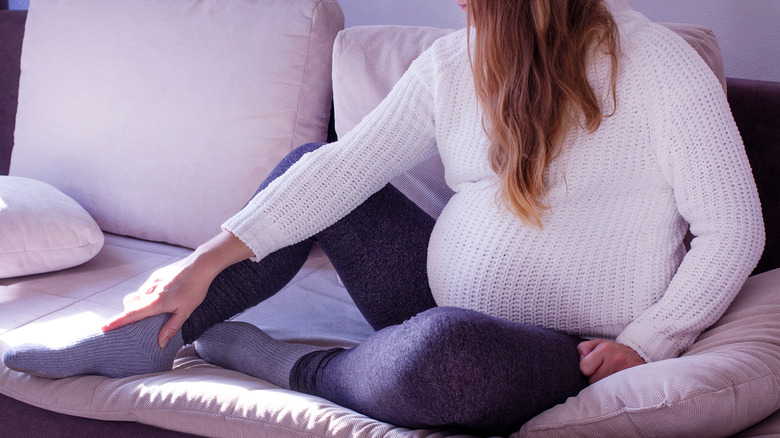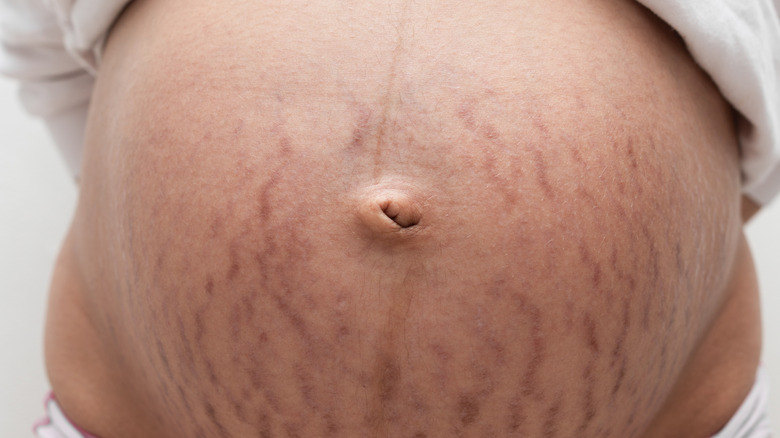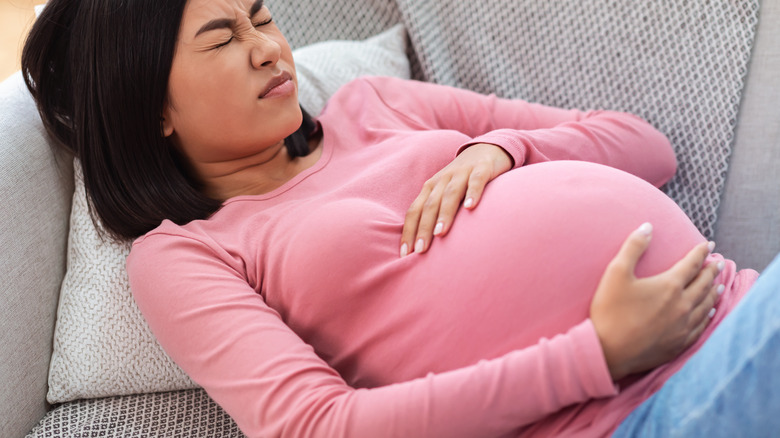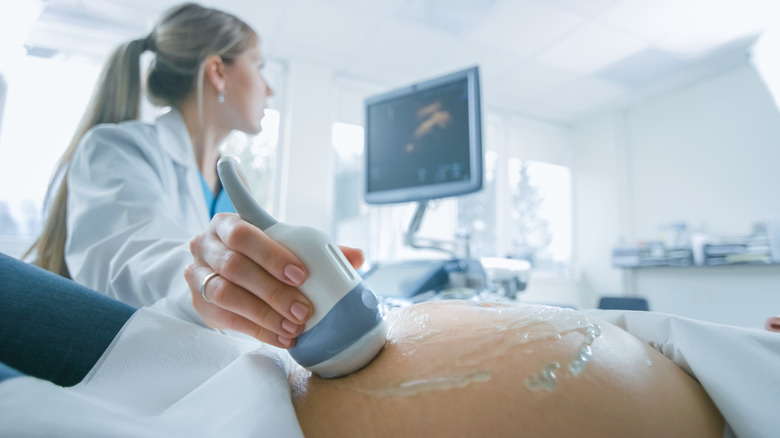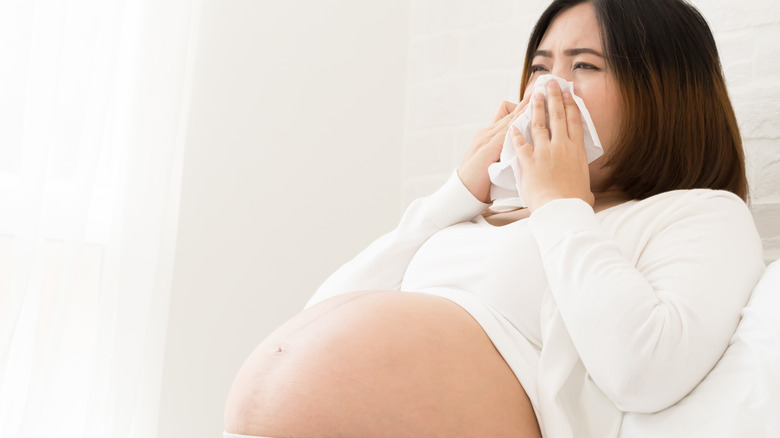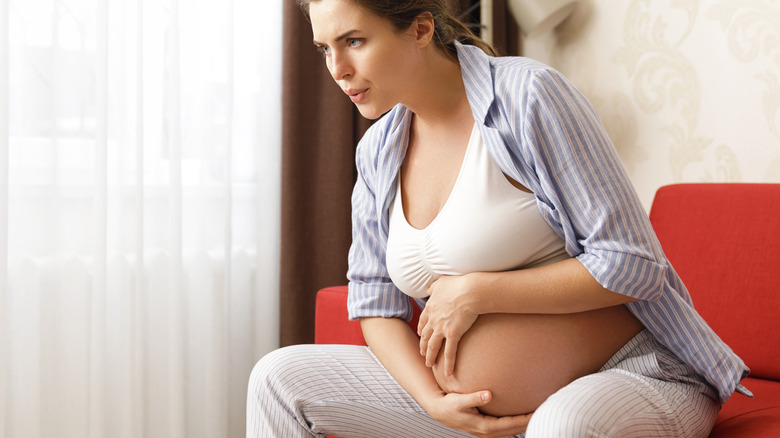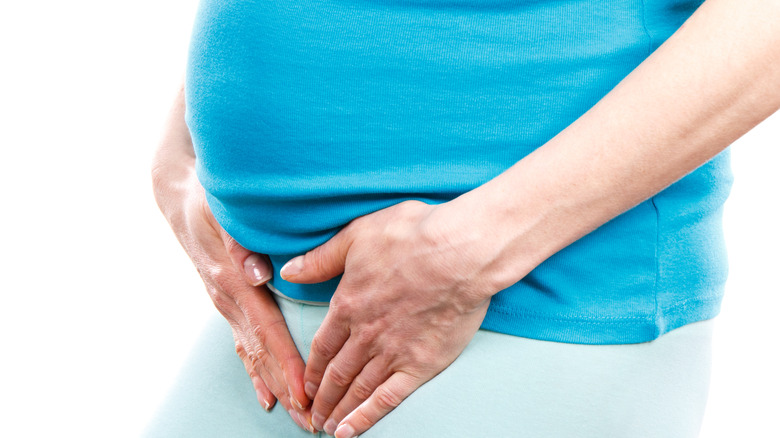What To Expect During The Second Trimester Of Pregnancy
Hooray — you're in your second trimester, which means you're almost halfway through your pregnancy! For many women, the second trimester is the most exciting. The worst of your morning sickness should have subsided by now, and you may notice you're not as tired as you were during the first trimester of your pregnancy. During these next three months, you'll notice a lot of new changes going on in your body. However, this trimester, you will actually see some of these changes on the outside, like your growing belly.
What exactly is the second trimester? The second trimester of pregnancy is counted from week 14 to the end of week 27, which is approximately 14 weeks long, according to the Cleveland Clinic. During this time, not only will you start to feel pregnant, but you may also observe that the people around you will start to notice that you are pregnant.
A lot will happen during your second trimester, and many of the symptoms you felt during your first trimester (like nausea, fatigue, and breast tenderness) will begin to subside. However, the second trimester may bring about other pregnancy signs, such as stretch marks, swelling, and itching (via Medical News Today). During these next three months, your body will continue to go through changes as it's busy making your baby. Here's what else you can expect during your second trimester of pregnancy.
Appetite increase
If you can't seem to control your urge to eat during this trimester, know that this is quite common. Right about the time your morning sickness starts to fade, you may notice your appetite conveniently starting to increase. This increase in hunger is due to your baby growing and needing proper nutrition and extra nourishment (per Healthy Pregnancy). It's also because of an increase in the hormones leptin and neuropeptide Y. Leptin is a hormone that is associated with your appetite and metabolism, while Neuropeptide Y triggers your appetite. When both of these hormones are elevated, it affects how much you want to eat.
To support your growing baby, you only need a maximum of 350 extra calories a day during your second trimester (per What to Expect). So, if you're trying to satisfy your increased appetite, be sure to remember that while you may be eating for two, you don't need to overdo it. To keep your hunger in check, be sensible about portions and opt for 5-6 meals every three hours. Choose fresh foods over processed foods, and remember to stay hydrated.
Dizziness
Dizziness is a normal symptom to experience during pregnancy, as there are a lot of hormone changes going on (as well as increased blood flow) which can cause your blood sugar to drop (via WebMD). Your uterus is also expanding during this trimester, which can put pressure on your blood vessels. If you lay on your back, you may notice that you tend to get dizzy. This is because your uterus is blocking the blood flow from your legs to your heart.
Dizziness can also be from gestational diabetes (per Healthline). This is something you'll be checked for as early as 24 weeks into your pregnancy. Gestational diabetes occurs when your blood sugar gets too low. If you get diagnosed, you'll have to keep your blood sugar in check throughout the rest of your pregnancy.
If you're feeling dizzy, lightheaded, unbalanced, or faint, lay down on your side. It's also recommended to increase your fluid intake, and avoid standing for long periods of time (via the Mayo Clinic).
Skin changes
Some other changes that you may notice during the second trimester are changes in your skin. You've probably heard of the "pregnancy glow" (when your face looks brighter due to an increase in blood flow), but have you heard of the mask of pregnancy? This is an increase in pigmentation known as melasma which causes dark spots to appear on your forehead and cheeks. Usually, this disappears after the baby is born, but you can help prevent it by wearing sunscreen daily and keeping your face protected from the sun (via the American Pregnancy Association).
Other skin changes that may occur are skin tags, new moles, or itchy or blotchy skin (per Healthline). You may also get a heat rash or notice that your skin looks oilier. Some women experience a darkening of their skin. Experts are not sure why this happens, but they think it may be because of an increase in estrogen. If you notice your skin is darker around your belly button, nipples, or armpits, know that this is quite normal, and should fade away after you give birth.
Growing belly
If you're wondering when your belly bump is going to start to show, it's during this second trimester. According to Flo Health, first-time mothers should expect to see some expansion in their belly as early as 12 weeks. However, it will ultimately depend upon the number of babies that are in your belly, as well as your body composition. If you were overweight before your pregnancy, then it may be harder to notice a bump than if you had a lower starting body weight.
If you're waiting to see a noticeable bump, this should happen around midway through your second trimester. Dr. Marquita Anderson, an ob-gyn in Texas, told The Bump that right around 20 weeks, many women will start to "pop." For some women, it can feel like it happened overnight. You may also notice a belly line (a dark vertical line that goes down your abdomen) during your second trimester. This is common, and will disappear gradually after you give birth.
Fetal movement
One of the most exciting moments in your second trimester is when you feel your baby move for the very first time. This movement in the uterus is called quickening (via the Cleveland Clinic). Quickening feels different for everyone, but some women describe the sensation as a fluttering feeling or like little pulses in your belly. If you've never had a baby before, then this feeling will likely be very exciting for you. It will also be a great reassurance that your baby is growing.
You should begin to start feeling your baby's movement at around 16 weeks into the pregnancy. However, if this is your first baby, you may not feel it until near the end of your second trimester (around week 25). As your baby grows, you'll be able to feel it moving more frequently. If you don't feel your baby move by week 25, don't panic — babies move at different times of the day (per WebMD). But if you're really concerned, you can contact your doctor.
Swelling
Your body will be going through a lot of changes during the second trimester, and the result of that may be swelling. Don't worry, though, as this is completely normal.
"About two-thirds of all women will have some form of swelling during pregnancy," says Michael Cackovic, a medicine physician at Ohio State University Wexner Medical Center (via The Bump). Your body may swell because your body is producing about 50% more blood and fluid to sustain the baby that is growing inside of you, says the American Pregnancy Association. This extra fluid is helping to prepare your body to deliver the baby.
If you're experiencing swelling, especially in the feet, there are a few things you can do to get relief at home, says Healthline. First, reduce your sodium intake, as this will help reduce water retention. Next, eat more foods that are high in potassium (like bananas and spinach), as this will help to balance the amount of fluid your body holds on to. Lastly, sit with your feet elevated to help drain fluid.
Stretch marks
In addition to the swelling, you can add stretch marks to the list of things you may possibly get during your second trimester.
These marks that some women call the "red badge of motherhood" can appear during the end of your second trimester (per What to Expect). You may notice pink, red, purple, or brown "streaks" on your hips, thighs, breasts, butt, or belly. If you're one of the 90% of women that get stretch marks, you can attribute it on genetics or how much weight you gained during pregnancy. The quicker (and greater) your skin expands, the more likely you'll get stretch marks, says Baby Center.
While there's no way to prevent stretch marks (yet), creams and lotions can help make your skin feel better, while water can help keep your body and skin hydrated. After the baby is born, you can try a retinoid or laser treatment to boost collagen, or perhaps gels with hyaluronic acid (via WebMD).
Fetal development
During the second trimester, each week will bring something new in terms of your baby's development.
At around 14 weeks, your baby will start sucking and swallowing — and if you're able to get a sonogram during this time, you may even be able to see it suck its thumb (via Pampers). Around 16 weeks into the pregnancy, you may start to feel movement. At 17 weeks, your baby will get a waterproof barrier that protects the skin. At 22 weeks, your baby's eyebrows will be visible — and a week later, you can start to sing or play music for your belly, because your baby will be able to hear and respond to sound. At 27 weeks, your baby will begin to smile, so if you're able to capture this on a 3D or 4D sonogram, now is the time to schedule that session.
By the end of your second trimester, your baby will weigh about 2-3 pounds and be approximately 13 to 16 inches long (via Johns Hopkins Medicine).
Braxton-Hicks contractions
During your second trimester of pregnancy, you may experience Braxton-Hicks contractions. According to a paper (via StatPearls Publishing), these so-called "false labor pains" are your body's way of preparing you for labor. It's important to note that they do not indicate that you are in labor; they are just your uterine muscle contracting. If you get these types of false contractions, they may feel like menstrual cramps and feel uncomfortable, but they are not painful. You may feel them later in the day or into the evening, after you exercise, or after sexual intercourse (via the Mayo Clinic).
However, if the contractions become stronger or occur at regular intervals, then contact your doctor right away, because you may be in preterm labor. You can tell the difference between real contractions and Braxton-Hicks contractions by consistency and intensity (per Medical News Today). Real contractions occur at regular intervals and increase in strength, while false contractions are sporadic and do not increase in intensity. Recognizing the difference between the two will help you know when to contact your doctor.
Routine tests
During the second trimester, your prenatal doctor visits will include several routine tests. Between weeks 15 and 20, you will undergo a multiple marker test, which is a blood test to see if the baby has any risk of specific genetic conditions or birth defects (via Kids Health). These results can be combined with the blood tests you took during your first trimester to give you a more accurate result.
Between weeks 24 and 28, you will get a glucose screening, which checks for gestational diabetes. This is a condition that can develop during pregnancy, but don't worry, because it's a short-term form of diabetes that can be treated when caught early. For this test, you will have to drink a sugary liquid, wait an hour, then get a blood test to check your glucose levels.
During your mid-trimester, you will get an 18-20 week ultrasound (per Johns Hopkins Medicine). This ultrasound will confirm your due date, as well as the number of fetuses you have in your belly. It'll also check for any fetal abnormalities and the amount of amniotic fluid you have. In addition to that, it will monitor fetal growth, behavior, and activity, and help determine how long your cervix is.
Nasal congestion
An unpleasant change that you may experience during this time of your pregnancy is a stuffy nose. You may think that you're getting a cold, when you're really experiencing what they call gestational rhinitis or pregnancy rhinitis (via GoodRX). This is a condition that only happens when you're pregnant, and once your baby is born, it usually gets better.
No one knows why as many as one-fifth of all pregnant women experience this, but some experts think it may have something to do with dust mite allergies or cigarette smoking. It's also linked to obstructive sleep apnea (OSA) when you have a hard time breathing through your nose when you sleep. The extra weight you're carrying during pregnancy can worsen this problem.
To ease congestion or pregnancy rhinitis, Baby Center suggests elevating your head while you sleep, taking warm showers then staying in the bathroom to breathe in the steam, and drinking plenty of fluids. These tips, along with a humidifier or vaporizer in the bedroom at night, should help relieve some of your congestion.
Crying spells
Do you feel like your emotions are all over the place, or that you can cry at the sight of spilled milk? If you're experiencing crying spells, you're not alone (via Healthline). Many women go through this, and it's completely normal. During your second trimester, your hormones continue to shift as your body continues to change. These changes can increase your anxiety, and little things like dropping a glass of milk can trigger your emotions.
While it's nearly impossible to try and control your hormonal shifts during pregnancy, you can learn how to deal with these emotions and make them more manageable. Taking time for self-care as well as eating and sleeping well can significantly contribute to your emotional stability, says the American Pregnancy Association. Try to get the recommended eight hours of sleep at night, and go for healthier food options instead of processed products. If you're still having a hard time managing your emotions, consider speaking with a professional therapist who can give you the extra support and care you need.
Breathlessness
Do you have difficulty catching your breath just from climbing the stairs? A study published in Clinical Cardiology states that this happens to an estimated 60% to 70% of pregnant women. This typically occurs because your growing uterus is pushing up against your lungs. While it's usually harmless, it can lead to other pregnancy complications. During the second trimester, you may experience an increase in shortness of breath due to the increase in the amount of blood in your body. This increase makes your heart pump harder making you feel some breathing difficulties.
To help manage this and make you feel more comfortable, you can start by practicing better posture. You can also allow gravity to give your lungs more space by propping pillows up behind your back while you sleep. If it's becoming too bothersome, then check with your doctor to rule out any complications (via Medical News Today).
Urinary tract infection
A urinary tract infection (UTI) is yet another physical and hormonal change that can occur during pregnancy. A UTI happens when bacteria enter your urinary tract, resulting in painful urination, among other symptoms. According to the Centers for Disease Control and Prevention (CDC), about half of pregnant women are diagnosed with a UTI during their second trimester compared to their first trimester.
But how do women get a UTI during pregnancy? Your growing uterus, along with your changing hormone levels, can be held responsible for that (via Everyday Health). Emptying your bladder can become difficult when your uterus is compressing against it. Also, when your progesterone and estrogen levels are on the rise, it can weaken your bladder. If you feel a frequent urge to use the bathroom, pass only a small amount of urine at a time, feel a burning sensation, have pelvic pain, or notice your urine smells weird or looks cloudy or pink, contact your doctor immediately so you can get medication to treat your symptoms.

